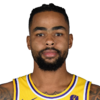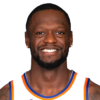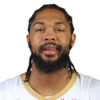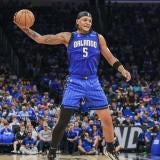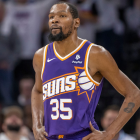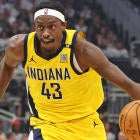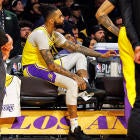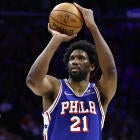As teams begin to be eliminated from contention and their season winds down, we’ll take a look back at what happened and bid them farewell. We begin with a fascinating team that was better -- and more exciting -- than you would think, the Los Angeles Lakers.
- Team: Los Angeles Lakers
- Coach: Luke Walton
- Record at time of publication: 21-52
- MVP: Julius Randle
This isn’t the worst Lakers team of all time. This isn’t even the second-worst Lakers team of all time. Last season was the worst Lakers team, ever, and the season before that the second-worst. So if that’s the standard, this season was a sterling success. And the Lakers got off a to a great start, and were .500 at the end of November. Unfortunately, since Dec. 1, they have the same number of wins as the Brooklyn Nets.
When you’re tied for the third-worst record in the league, it’s pretty jarring to say “they were actually worse than that,” but with these Lakers, it’s true. Their October-November performance was a trick of the light, starting with their knocking off the Houston Rockets, now the third seed in the West, on opening night. A better indicator of team performance than record has always been point differential, especially per 100 possessions, which factors for pace of play.
The Lakers are dead last in that category this season, outscored by 7.8 points per 100 possessions. Truth be told, the Lakers are the worst team in the league, again.
Other than that, though, things are looking up!
The stormy present
The biggest story to come out of Lakerland this season was obviously the house clearing Jeanie Buss finally did. After years of listening to her brother Jim Buss rationalize and move the goalposts on his “two years that was looking more like four depending on how you defined it” deadline, after watching the garbage play and garbage coaching that Buss put on the floor for two seasons, after watching him strike out time and time again not only in signing marquee free agents, but even getting meetings with them, the Lakers matriarch finally undertook a “Game of Thrones” style maneuver and just axed the whole regime. Longtime GM and former player Mitch Kupchak who oversaw two championship teams? Gone. Her own brother? Gone. Even helpless bystander/head of PR John Black was removed.
In their place now stand Magic Johnson and Rob Pelinka. The formula here is pretty clear: Hall of Famer with player cache meets superstar agent with longstanding ties for the business side. It’s not the worst plan; it’s also a very Lakers plan. It’s clear the Lakers are not going to go the route of building themselves back up slowly. They are going to swing for the fences. The idea is that if Magic Johnson is sitting across the table from you, asking you to be a Laker, that’s going to change hearts and minds. But bear in mind that hasn’t been enough in a lot of places. Larry Bird’s not signing superstars, but you could say that’s because he’s in Indiana. Isiah Thomas in New York? Joe Dumars in Detroit? Maybe Magic is the difference here.
But the ideal scenario is to repeat what former Lakers coach Pat Riley did in Miami in 2010. In pulling off the triad with LeBron James and Chris Bosh joining Dwyane Wade, Riley instantly put the Heat back into the title picture, with bold moves alone. However, with Wade, they already had a superstar in place. The Lakers don’t. When Johnson walks into a meeting to try and seal the deal on bringing in Blake Griffin, or DeMarcus Cousins, or whoever, he’s selling them on playing with a group of guys who aren’t old enough to get the car rental discount.
Beyond that are all sorts of questions about how Johnson will handle analytics, something former players have been notoriously sour on. However, Johnson is an investor in a real-time analytics company, and has openly said he thinks the Lakers are behind the times. I’ll be honest, had you asked me before researching what I thought Johnson’s position on analytics would be, I assumed it would be negative, because that’s uniformly the position from former players, especially those who played in the ‘80s. But instead, Johnson seems tech-initiative, and this might be where his business acumen and understanding of evolving trends plays a hand.
When the Lakers made this move two days before the trade deadline, there was all sorts of concern about what kind of moves the team would make and if they would try and make a splash out of the box which could hamper them long-term. Instead ... they were restrained, patient, only dealing Lou Williams for good return. It was a great start to the regime. Where they go from here will be interesting. And much of that has to do with the current roster.
Promising but no promises
The Lakers’ key components are mostly built around guys that, when they have their best nights, look like key components of a future championship team, and when they have bad nights, look like bench players. The bigger concern is the absence of an identifiable “guy;” there is no Kevin Durant who you look at and say “he’s going to be special and a top-five player in this league.” There are guys you can see getting there. But no one who is absolutely there.
Here’s a list of the players with approximately Russell’s points and assists per 100 possessions, and as many shots as he takes in their second season. The interesting names on that list speak to the wild swings that Russell’s career projections arc could take. Stephon Marbury sticks out to me the most, especially with Russell’s brash attitude. Russell has the highest effective field goal percentage of any player 20 years old on that list. He’s 16th out of 22 in VORP. He averages the same turnovers per 100 possessions as Stephen Curry did in his second season, when Curry was two years older.
(Side note: Jameer Nelson was really great as a second-year player at age 23.)
But the players on that list go from Tony Parker to Tim Hardaway to Brandon Roy to Beno Udrih to Kelvin Ransey to Gilbert Arenas to Earl Boykins. Russell’s youth is a boon in comparison, he’s ahead of his age in production and his shooting efficiency is toward the higher end. There are Hall of Famers on that list and players no one will remember. With Russell, we’ll probably remember him.

Like Kyrie Irving, Russell has had some issues adapting to expectations and life as a young NBA player. He has bristled at being benched. His confidence seems to surge and wane. Russell looks like the Laker most likely to become a truly dominant, top-five player, but you also don’t look at him now and see it. You see the potential, but not a clear line. With some players you could tell “they’re going to be great.” With Russell, it’s “he could be great.” And that creates problems for a franchise that needs sure things.
Randle is already underrated. His list of comparable players in their third year is small, with mixed results. Most notably, among players averaging more than 20 points and 14 rebounds per 100 possessions, he is the only one averaging six assists to go along with it. Ever.
This doesn’t make what Randle is doing historic, but it does make him uniquely special in today’s NBA. Randle has the capacity to truly follow Draymond Green in terms of play-making and offensive ability as a combo-big. That doesn’t mean he’ll have Green’s defensive capacity or insane motor, but it does show that he’s as skilled as Green already. He can be a play-maker for the Lakers in a way they need. Basically, Randle can tie the room together, like a great rug. But he also has to fix his mental approach, as Forum Blue and Gold noted:
Then, of course, there’s Randle’s mindset and his clear belief in himself as a player. I’ve consistently labeled Randle an alpha player, someone who wants the ball because of his utmost confidence. I love that he doesn’t back down from any situation; that he truly wants an outsized role because he believes he’ll not only fill it, but do it well. But that confidence cuts both ways. If he’s not good enough to be a foundational player, he needs to recognize and find other ways to contribute by doing smaller things, not just show (what can be quite) poor body language and disengage.
One of the bigger critiques of Randle can be that as hard as he can go during games, that effort level is not consistently sustained. After a monster game against the Hornets the first piece of praise Luke Walton offered of Randle’s performance was noting that it was the longest period (Walton) had seen where Randle played that hard. That’s a compliment, but also a backhanded one. Almost an asking of “why can’t he do that more?” without really phrasing it in the form of a question.
(Courtesy of Forum Blue and Gold: The Riddle that is Julius Randle)
Randle is unlikely to ever be a superstar, but he projects as a guy who, if he gets in the right mental space, can be part of the foundation.
There’s still so much we don’t know about Ingram. He’s slight, but tenacious. He’s talented, but raw. The spark is there, but he has lacked both the production and efficiency to make his future really promising. It’s all eye test right now with Ingram, those flashes that you see, the little moments that indicate what he’s capable of. I’m not worried about the shooting -- all rookies are bad shooters. It’s the production, across per-36-minutes and 100 possessions, that’s concerning. He’s not great in any particular area. He doesn’t have to be, but again, for what the Lakers are looking for, it’s hard to see a dominant player. A good one? Certainly. A great one? Maybe, maybe even probably. But a dominant one?
We have more questions about Ingram than answers.
The rest
- Jordan Clarkson took a huge step backward this season that was flat-out concerning, especially under Luke Walton’s new offense. Shooting sub-33 percent from 3-point range as a 2-guard is bad when you have his defensive profile. Clarkson’s efficiency numbers are the best of the young guys ... but he’s 24. They should be higher. He averages nearly as many turnovers as assists. This was a down year for him and he suddenly looks like “just a rotation NBA guard.” That’s not bad, but they needed more.
- Larry Nance Jr. continues to be great. He’s 24, so there’s only so much he can get to, but 15-11 per 100 possessions and shooting over 50 percent from the field, with the number of highlight plays he makes and how hard he plays, is a great formula. Nance certainly doesn’t look like a star, but he’s a guy you want on your squad making plays for you.
- Nick Young had a good season on a bad team. Rinse, lather, repeat.
- Ivica Zubac is fascinating. His production numbers are ridiculous, and he continues to show what he did at summer league, in that he can have really big nights.
- David Nwaba has been a nice find, having a good run.
- All the veterans, all of them, were terrible, except for Tarik Black.
The future
The Lakers, especially if they keep winning, could lose their draft pick. It’s top-3 protected and they are a half-game up for second in the lottery standings with Orlando right now. If they win enough to fall to third, only one team has to jump them for the Sixers to get their pick. That would be disastrous, especially in this class.
Kevin Durant is not signing there. Any moves for Blake Griffin or another star would have to be made in tandem with trading the young talent for a star. But there’s a model you can see. Trade young pieces for Paul George or DeMarcus Cousins, sign the other in free agency, and boom, you have two stars. That puts you back on the map. And the Lakers will continue to grow and get better. They have time, if they give it to themselves. The youngsters won’t all have linear progressions without downturns, but they will get better over time, and you might find a real superstar between the three kiddos.
Luke Walton hasn’t been mentioned much, but it’s hard to blame their struggles on him. You rarely watch the Lakers and think “they’re playing the wrong way,” as you did with Byron Scott. If they struggle for another year? Sure, you can start to look at Walton and whether he has the team going where it needs to go. But on the surface, he has done a good job, or good enough in a tough spot.
All eyes will always be on Lakerland. They command that much attention as the most popular franchise in the league. But there is no clear path. You don’t look at them the way you look at the Wolves and think “sooner or later they’re going to be great.” Their core doesn’t look as promising as some of the others. And there’s always that pressure to make the big move now. The thing about big moves is they make for bigger mistakes.
If nothing else, the Lakers will continue to be a fascinating team to speculate in the seasons to come.







